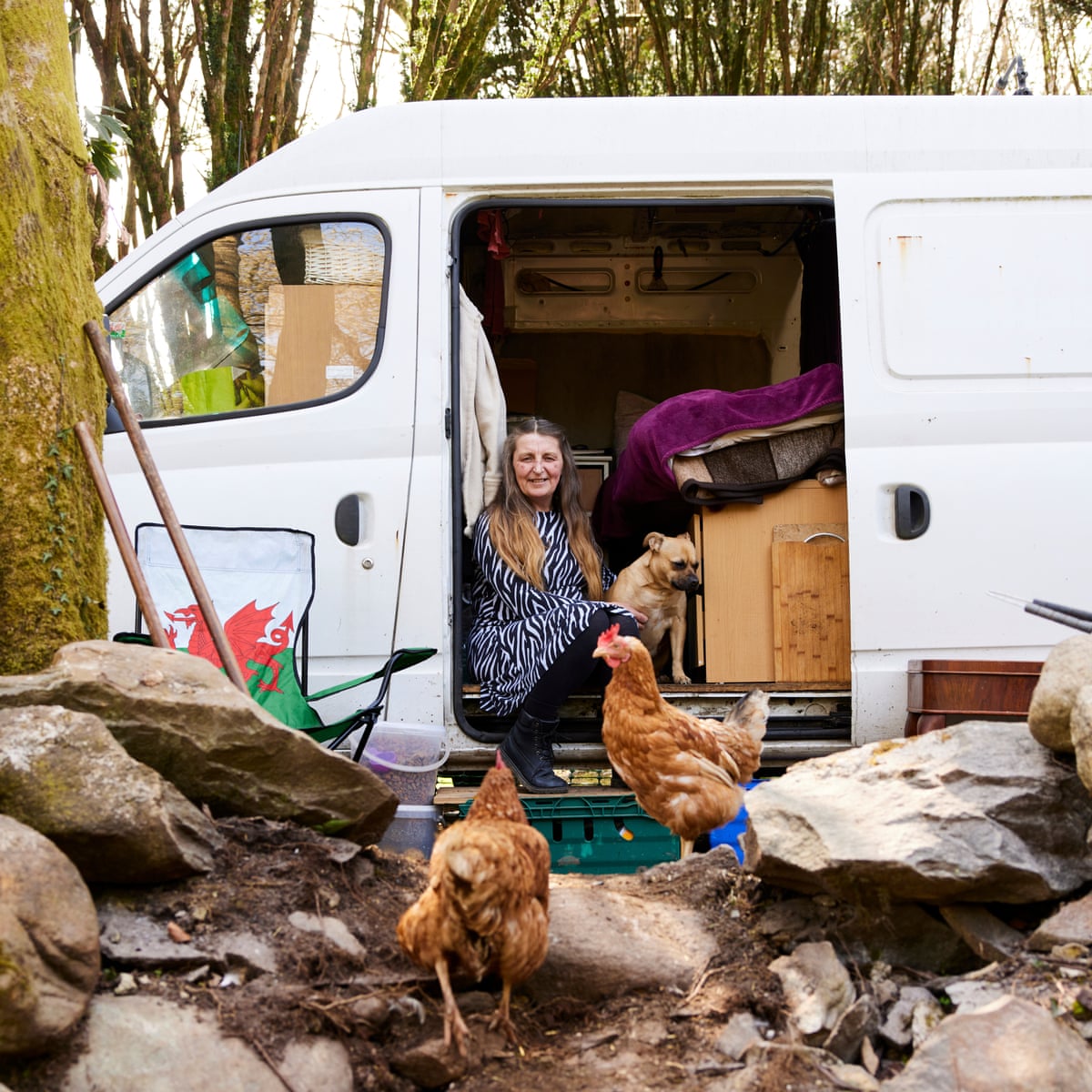Living in a van offers a minimalist lifestyle with the freedom to travel. It requires careful planning and adaptation to a compact space.
Embracing van life means joining a community of individuals who value mobility and simplicity over traditional living arrangements. This way of life is not just about the vehicle; it’s a commitment to a pared-down existence, often centered around the principles of sustainability and financial freedom.
The transition to van living involves significant downsizing and learning to maximize every inch of space for storage and daily activities. While the thought of waking up to new scenery regularly is appealing, potential van dwellers must consider the practicalities: from securing reliable sources of power and water to maintaining personal hygiene and managing waste on the road. Despite these challenges, for many, the trade-offs are worth the unparalleled sense of adventure and autonomy that van life provides.
The Rise Of Van Life
The concept of living in a van began as a way to embrace freedom and simplicity. This lifestyle, often called “van life,” has roots in the nomadic existence of earlier times. The movement gained traction during the 1960s and 1970s with the counterculture community. They sought an alternative to societal norms and the traditional 9-to-5 routine.
With the advent of the internet and social media, van life’s popularity has soared. Images of customized vans and scenic backdrops flood Instagram and YouTube, inspiring a new generation. Many people now see van life as a way to escape the rat race and live a life of adventure. Digital tools allow them to work remotely and travel extensively, all while building online communities of like-minded individuals.

Credit: www.theguardian.com
Choosing The Right Van
Selecting the ideal van involves multiple key factors. Think about size, fuel efficiency, reliability, and cost. Your choice impacts your comfort and travel experience.
Space is crucial for long trips. A larger van offers more room to live and store items. Yet, it may be tougher to drive and park. Smaller vans are easier to handle but have less living space.
Consider fuel efficiency for budgeting. Vans that use less gas save you money over time. Reliability is also important. A van that breaks down less means fewer repairs. Finally, cost affects your budget. You might want a newer model or a used one to save money.
| Van Model | Size | Fuel Efficiency | Reliability |
|---|---|---|---|
| Mercedes Sprinter | Large | Good | High |
| Ford Transit | Medium | Very Good | High |
| Dodge Promaster | Large | Average | Good |
Conversion Essentials
Designing your living space in a van demands creativity and smart planning. Efficient use of space is key. Think about foldable furniture and multi-use items. Storage solutions are vital. Utilize vertical spaces with shelves and hooks.
For must-have amenities, prioritize a comfortable bed. Insulation is crucial for temperature control. A reliable power source, like solar panels, keeps electronics charged. Include a ventilation system to maintain air quality. Don’t forget a compact kitchen with a stove and fridge.
| Amenity | Importance |
|---|---|
| Comfortable Bed | Restful sleep |
| Insulation | Warmth and coolness |
| Power Source | Device charging |
| Ventilation | Fresh air |
| Compact Kitchen | Cooking and storage |
Sustainable Living On Wheels
Solar power is a key part of living sustainably in a van. Panels on the roof catch sunlight. This sunlight turns into electricity. The electricity gets stored in batteries. This lets you use lights and charge devices anytime.
For water conservation, every drop counts. Collecting rainwater is one great method. Using water-saving taps also helps. Always fix leaks fast to save water.
Navigating Legalities
Parking and overnight stays can be tricky for van lifers. Research local laws to avoid fines. Some cities allow overnight parking in specific areas. Look for signs indicating restrictions. Apps and websites may also provide helpful information.
Insurance and registration are vital for van living. Choose a policy that covers your lifestyle. Registration should reflect your primary residence. Check state requirements, as they vary widely. Keep documents accessible for any encounters with authorities.
Budgeting For The Nomadic Life
Managing living expenses while embracing a nomadic lifestyle requires careful planning. Creating a budget is vital to ensure you can sustain life on the road. Track all costs, including gas, food, insurance, and maintenance. Be mindful of spending to avoid financial stress.
Developing diverse income streams is crucial for financial stability. Consider remote work, freelance gigs, or seasonal jobs. Many van lifers sell crafts or offer services aligned with their skills. Online platforms can be a great way to connect with clients or sell products. Remember, a reliable internet connection is key for sustaining these income sources.
| Expense Type | Estimated Cost |
|---|---|
| Fuel | $150-$300/month |
| Food | $200-$400/month |
| Insurance | $100-$200/month |
| Maintenance | Varies |
Staying Connected
Maintaining an internet connection on the road is crucial. Mobile hotspots and data plans offer flexibility. Many travelers rely on public Wi-Fi at cafes or libraries. Yet, secure connections are a must. Using a VPN can help protect your data.
Community building among van lifers is part of the journey. Social media groups and forums are platforms for sharing tips. Meet-ups and events are also perfect for making new friends. Many use apps to find nearby van dwellers.
| Connection Type | Pros | Cons |
|---|---|---|
| Mobile Hotspot | Portable, convenient | Limited data, coverage |
| Public Wi-Fi | Free access | Security risks |
| VPN | Secure browsing | May slow speed |

Credit: destinationlesstravel.com
Challenges And Solutions
Living in a van can sometimes feel lonely, affecting your mental health. Creating a routine helps. Join online communities of fellow van lifers. They understand your lifestyle. Make regular stops at popular van life spots. You’ll meet people who share your interests. Regular video calls with family and friends also combat loneliness.
Van maintenance is key to a smooth journey. Always have a basic toolkit and spare parts. Learn simple repair skills. This saves money and time. Know the nearest mechanics when traveling to new places. Keep up with regular vehicle checks. This will lower the chance of breakdowns. A roadside assistance plan is a good backup.
Stories From The Road
Van life brings both joy and challenges. Each day offers a new adventure. You might wake up to the sound of the ocean or find yourself lost in a forest. Some days, fixing a broken van part becomes the day’s big task. Yet, these experiences teach resilience and resourcefulness.
Living on the road also leads to life-changing experiences. Meeting new people and exploring diverse cultures broaden one’s perspective. The simplicity of van life can deeply change how you view possessions and happiness. It’s not just about travel; it’s about transforming how you live and think.

Credit: www.offthegridwithakid.com
The Future Of Van Living
Van living is gaining a high-tech edge as innovations emerge. Solar panels are now more efficient. They power devices and appliances on-the-go. Smart technology integrates with vans. It allows remote control of lighting and temperature. Sustainability is a big focus. Vans use recycled materials and have lower emissions.
The view on nomadic living is changing. Many people see it as a legitimate lifestyle. Social media shows the joys of living freely. It inspires others. Communities of van lifers are growing. They share tips and locations. This lifestyle promotes minimalism and freedom. It is becoming more accepted and understood.
Can Living in a Container Provide the Same Freedom and Mobility as Living in a Van?
When it comes to the advantages of container homes, they do offer a great deal of freedom and mobility. However, living in a container may not provide the same level of flexibility as living in a van. While both options have their benefits, it’s important to consider your lifestyle and specific needs.
Frequently Asked Questions
Can I Realistically Live In A Van?
Yes, living in a van is feasible with proper planning, budgeting, and a flexible lifestyle. Essential considerations include vehicle choice, living amenities, and local laws.
Can You Live Fulltime In A Van?
Yes, you can live full-time in a van. Many people embrace this lifestyle for freedom and simplicity, but it requires careful planning and adaptability. Ensure you have essentials like a bed, kitchenette, and storage, and consider amenities for power, water, and internet.
Is It Legal To Live In A Van In The Us?
Living in a van is legal in the US, but local laws and parking restrictions vary. Always check municipal codes and zoning laws for compliance. Overnight parking may be prohibited in certain areas, requiring adherence to specific regulations.
How Much Money Does It Take To Live In A Van?
The cost of living in a van varies widely, typically ranging from $800 to $2,000 per month. Factors like van maintenance, fuel, insurance, and daily expenses influence this budget. Adjustments to lifestyle and location can significantly affect overall costs.
Conclusion
Embracing the van life embodies freedom, simplicity, and adventure. It’s a unique journey, tailor-made for those who crave exploration. Whether you’re a seasoned traveler or a curious newcomer, van living offers an unparalleled experience. Remember, the road is both your home and your destination—enjoy every mile.
{ “@context”: “https://schema.org”, “@type”: “FAQPage”, “mainEntity”: [ { “@type”: “Question”, “name”: “Can I realistically live in a van?”, “acceptedAnswer”: { “@type”: “Answer”, “text”: “Yes, living in a van is feasible with proper planning, budgeting, and a flexible lifestyle. Essential considerations include vehicle choice, living amenities, and local laws.” } } , { “@type”: “Question”, “name”: “Can you live fulltime in a van?”, “acceptedAnswer”: { “@type”: “Answer”, “text”: “Yes, you can live full-time in a van. Many people embrace this lifestyle for freedom and simplicity, but it requires careful planning and adaptability. Ensure you have essentials like a bed, kitchenette, and storage, and consider amenities for power, water, and internet.” } } , { “@type”: “Question”, “name”: “Is it legal to live in a van in the US?”, “acceptedAnswer”: { “@type”: “Answer”, “text”: “Living in a van is legal in the US, but local laws and parking restrictions vary. Always check municipal codes and zoning laws for compliance. Overnight parking may be prohibited in certain areas, requiring adherence to specific regulations.” } } , { “@type”: “Question”, “name”: “How much money does it take to live in a van?”, “acceptedAnswer”: { “@type”: “Answer”, “text”: “The cost of living in a van varies widely, typically ranging from $800 to $2,000 per month. Factors like van maintenance, fuel, insurance, and daily expenses influence this budget. Adjustments to lifestyle and location can significantly affect overall costs.” } } ] }